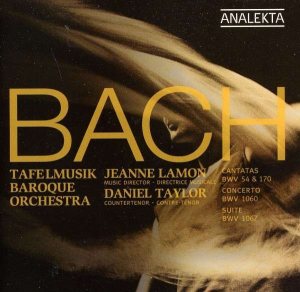 |
 |
|


alternatively
CD: MDT
AmazonUK
AmazonUS
Sound
Samples & Downloads |
Johann Sebastian BACH (1685
- 1750)
Vergnügte Ruh, beliebte Seelenlust (BWV 170)* [22:48]
Overture for violin, strings and bc in a minor (BWV 1067a) [19:24]
Widerstehe doch der Sünde (BWV 54) [13:10]
Concerto for oboe, violin, strings and bc in c minor (BWV 1060a)
[13:23]
 Daniel Taylor (alto), John Abberger (oboe, oboe d'amore*), Jeanne
Lamon (violin)
Daniel Taylor (alto), John Abberger (oboe, oboe d'amore*), Jeanne
Lamon (violin)
Tafelmusik Baroque Orchestra/Jeanne Lamon
rec. 30 March-1 April 2011, Humbercrest United Church, Toronto
 ANALEKTA AN 2 9878 [68:48]
ANALEKTA AN 2 9878 [68:48]
|
|
|
This disc comes with no title. It just says "Bach", with the
names of the performers. I really don't know which title would
have been appropriate as I can't discover a thread in the programme.
It seems that the four compositions have been put together at
random. One wonders whether it is the composer who is at the
centre or rather the performers. Moreover, all four works belong
to the most frequently performed and recorded. Considering the
world-wide economic crisis one would expect that record companies
would avoid releasing discs with repertoire which is already
available in many recordings, but that seems not to be the case.
If only this disc offered new insights or performances which
can compete with the very best, but that is not the case either.
One work in the track-list may catch the eye of a potential
purchaser. The Overture in b minor (BWV 1067) is one
of Bach's most popular pieces, and its last movement, Badinerie,
is often played as an encore in concerts. Here it is played
in a different key, A minor, and that can be explained by the
scoring. There is no transverse flute here, but rather a violin
as a solo instrument in various movements. It is assumed that
three of the Overtures as we know them are reworkings of earlier
pieces. It is possible that Bach composed them originally at
the court in Cöthen, where so many instrumental works were
created. There is no unanimity as to which instrument Bach had
in mind in this particular Overture. Joshua Rifkin suggests
the violin, whereas the American oboist Gonzalo X. Ruiz believes
the oboe is the more likely possibility. That is the version
performed by the Ensemble Sonnerie (reviewed
here). Jeanne Lamon plays the solo part here, and she does
so quite well. On the whole I prefer the Ensemble Sonnerie’s
performance. In the case of the present disc there is too little
differentiation between the notes and dynamically the performances
are pretty flat. In particular the rondeau and the sarabande
are not very engaging.
That is not just the case in the Overture, but also in the Concerto
in c minor (BWV 1060a). This is another reconstruction,
but far better-known than the Overture in its original version.
It has come down to us in a later reworking for two harpsichords;
there is general agreement that it was originally written for
oboe and violin. John Abberger and Jeanne Lamon give good readings
of the solo parts, but on the whole the performance is rather
unremarkable. The tempi are not fully satisfying: the allegros
are on the slow side, whereas the adagio is a shade too fast.
The two cantatas are from different periods in Bach's life.
Widerstehe doch der Sünde (BWV 54) is early, dating
from 1714. This is reflected in the scoring which includes two
viola parts. This was common practice in the 17th century, but
went increasingly out of fashion after the turn of the century.
In particular the first aria is very expressive, drastically
depicting sin as poison scattered by the Devil. That doesn't
really come across here; everything is far too innocent and
too sweet. Daniel Taylor sings nicely enough, but he fails fully
to explore the content. In the following recitative too little
attention is paid to individual words. Here I also noticed that
Taylor's voice lacks strength in the lowest register. Bach set
some crucial words to low notes in this work; here they lack
sufficient impact.
That is also the case in the cantata Vergnügte Ruh,
beliebte Seelenlust (BWV 170) which dates from 1726. In
that year Bach composed several cantatas for an alto soloist,
probably because he had a specially gifted singer at his disposal.
Taylor sings the first aria quite nicely, and the "delightful
rest" the text speaks about suits his voice well. The following
recitative is different: "The world, that house of sin, erupts
only in hellish songs". Again this recitative is far too harmless,
and Taylor doesn't make enough of the Affekt. The second
aria is another highly expressive piece: "How the perverted
hearts afflict me". The voice is here accompanied by the organ
which has an obbligato part. Bach requires an instrument
with two manuals. "We did not have access to a baroque church
organ for this recording, but were fortunate to have use of
a beautiful portative organ (...) and have adapted the hand-crossings
to make them playable on a single manual", Charlotte Nediger
writes in her liner-notes. I find this very odd: other performers
have sought and found an appropriate organ. If you can't find
one, then take another work to record. The changes in the registration
during the aria are uncalled for and damage its unity. The second
recitative is accompanied, and once again contains some quite
drastic pictures. Taylor's interpretation lacks depth and incisiveness.
All in all, this is a nice disc, sweet and lovely. However the
cantatas don’t call for these qualities. In these performances
they lack depth and expression. This is for diehard fans of
the artists.
Johan van Veen
http://www.musica-dei-donum.org
https://twitter.com/johanvanveen
Masterwork Index: Bach
cantatas
|
|












